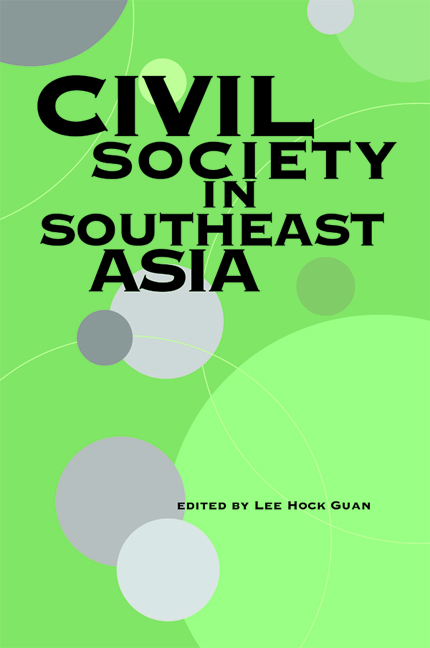Book contents
- Frontmatter
- Contents
- Preface
- About the Contributors
- 1 Introduction: Civil Society in Southeast Asia
- 2 Islam, Constitutional Democracy, and the Islamic State in Malaysia
- 3 Cracks in the Wall of Separation?: The Church, Civil Society, and the State in the Philippines
- 4 New Buddhism, Urban Space, and Virtual Civil Society
- 5 Women's Movement in the Philippines and the Politics of Critical Collaboration with the State
- 6 Participation of the Women's Movement in Malaysia: The 1999 General Election
- 7 Civil Society Effectiveness and the Vietnamese State — Despite or Because of the Lack of Autonomy
- 8 Relationship between State and Civil Society in Singapore: Clarifying the Concepts, Assessing the Ground
- 9 Civil Society in Malaysia: An Arena of Contestations?
- 10 Ethnicity and the Civil Rights Movement in Indonesia
- 11 Civil Society Discourse and the Future of Radical Environmental Movements in Thailand
- Index
6 - Participation of the Women's Movement in Malaysia: The 1999 General Election
Published online by Cambridge University Press: 03 November 2017
- Frontmatter
- Contents
- Preface
- About the Contributors
- 1 Introduction: Civil Society in Southeast Asia
- 2 Islam, Constitutional Democracy, and the Islamic State in Malaysia
- 3 Cracks in the Wall of Separation?: The Church, Civil Society, and the State in the Philippines
- 4 New Buddhism, Urban Space, and Virtual Civil Society
- 5 Women's Movement in the Philippines and the Politics of Critical Collaboration with the State
- 6 Participation of the Women's Movement in Malaysia: The 1999 General Election
- 7 Civil Society Effectiveness and the Vietnamese State — Despite or Because of the Lack of Autonomy
- 8 Relationship between State and Civil Society in Singapore: Clarifying the Concepts, Assessing the Ground
- 9 Civil Society in Malaysia: An Arena of Contestations?
- 10 Ethnicity and the Civil Rights Movement in Indonesia
- 11 Civil Society Discourse and the Future of Radical Environmental Movements in Thailand
- Index
Summary
INTRODUCTION
In the 1999 general election, for the first time in Malaysian history, the Malaysian women's movement fielded a woman candidate to run for a Parliamentary seat based on a platform of women's issues within the framework of justice, democracy, and sustainable development. This initiative, known as the Women's Candidacy Initiative (WCI), was part of an initial effort by activists to inject an issue-based discourse in electoral politics that have been largely dominated by the traditional ethnic- and party-based discourse. Significantly, this move also marked the women's non-governmental organizations’ (NGOs) direct involvement in electoral politics. The political atmosphere was tense with excitement as the popular perception, prior to the voting day, was that the ruling National Front (Barisan Nasional, BN) might lose its stranglehold on Parliament or that the Mahathir regime was nearing its end.
Undoubtedly, a contributing factor to the emergence of the vibrant reformation politics was the manner in which Anwar Ibrahim, the former Deputy Prime Minister (DPM), was sacked, brutalized while under police custody, and then sentenced to serve fifteen years for abuse of power and sodomy. Inspired by the spirit of the moment, the WCI sought to impress upon the public that it was high time to do away with injustice towards women as well. However, the WCI's alignment with the Alternative Front (Barisan Alternatif, BA), which comprised among others the Pan-Malaysian Islamic Party (Parti Islam Se-Malaysia, PAS), known for its conservative stance on women's issues, and the Democratic Action Party (DAP), which was beset by charges of undemocratic practices of its leadership, suggested that this move might be fraught with dilemmas and uncertainties. Another initiative from the women's movement was the Women's Agenda for Change (WAC), a lobbying initiative, where women's NGOs approached political parties from both the ruling and opposition parties to adopt the WAC agenda in their respective election manifesto. This chapter will reflect on the WCI's participation in the 1999 general election, in particular the responses of two women's NGOs, Friends of Women (Persatuan Sahabat Wanita Selangor, PSWS) and Sisters in Islam (SIS), to highlight the ambiguities towards this initiative.
- Type
- Chapter
- Information
- Civil Society in Southeast Asia , pp. 122 - 143Publisher: ISEAS–Yusof Ishak InstitutePrint publication year: 2004



